【牛津译林版 英语期末复习一本通 】第六讲 五年级下知识复习及专项训练
文档属性
| 名称 | 【牛津译林版 英语期末复习一本通 】第六讲 五年级下知识复习及专项训练 | 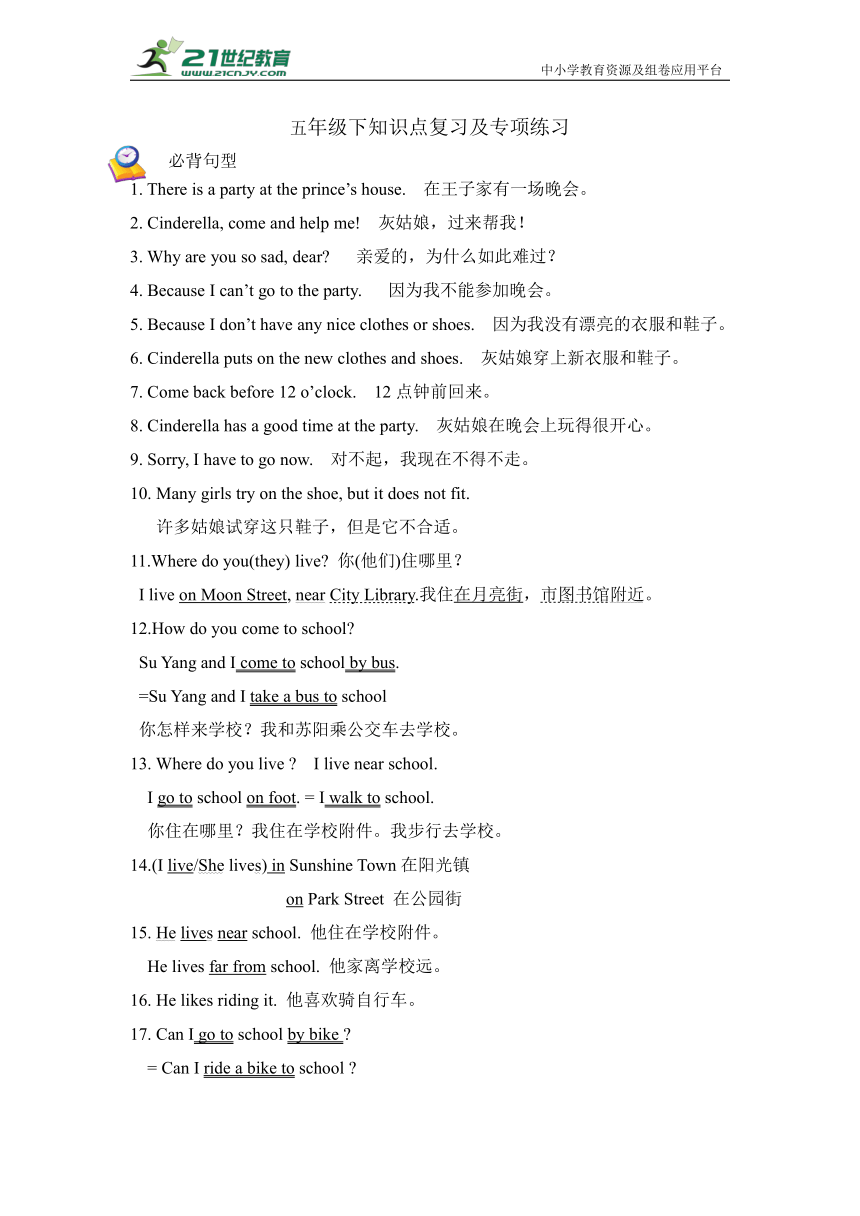 | |
| 格式 | docx | ||
| 文件大小 | 326.5KB | ||
| 资源类型 | 试卷 | ||
| 版本资源 | 牛津译林版 | ||
| 科目 | 英语 | ||
| 更新时间 | 2023-06-20 16:49:52 | ||
图片预览

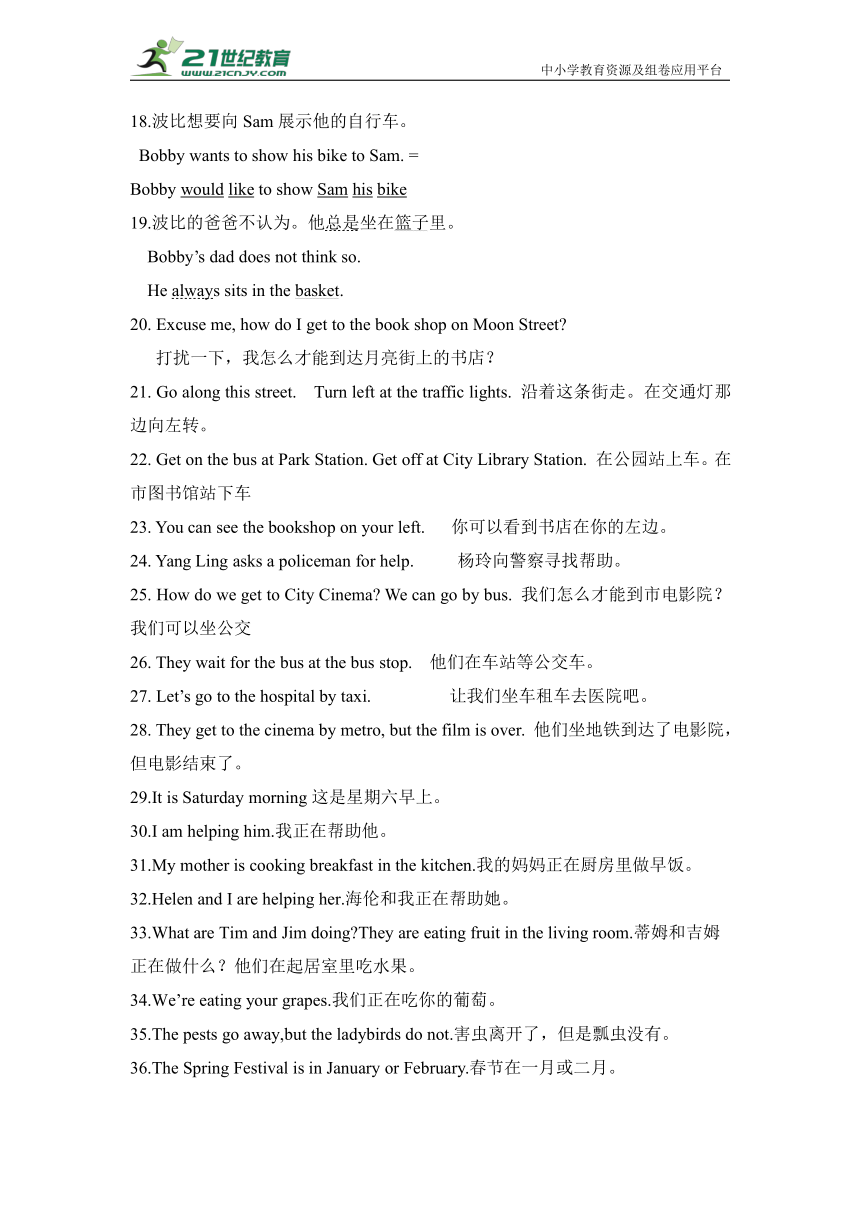
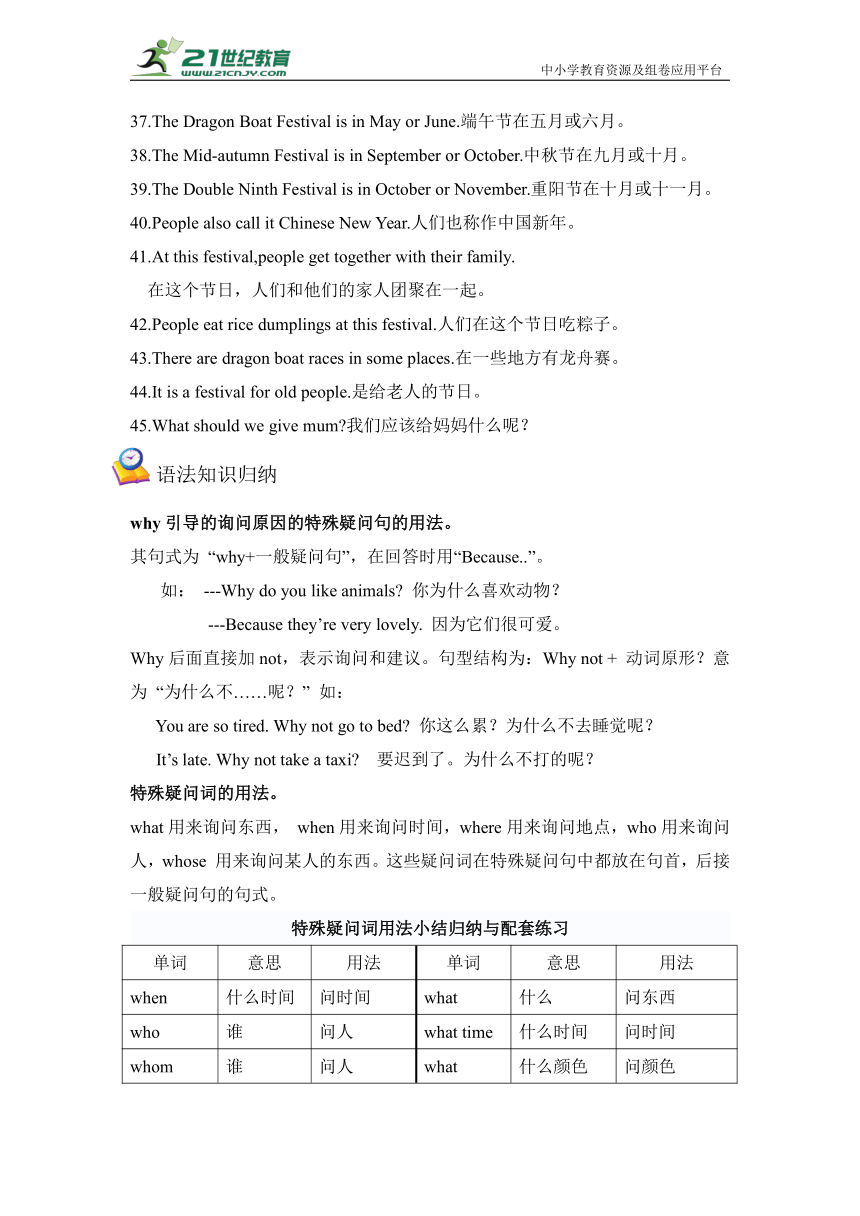
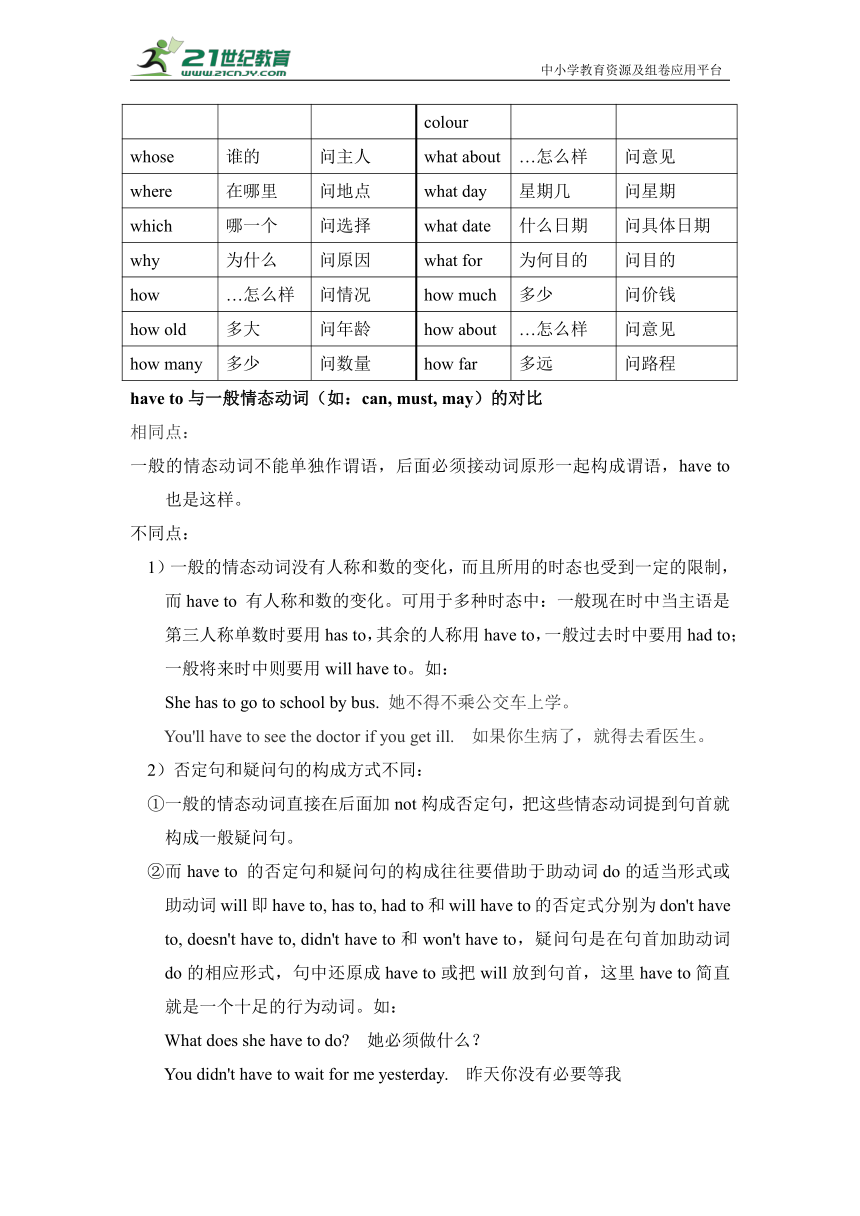
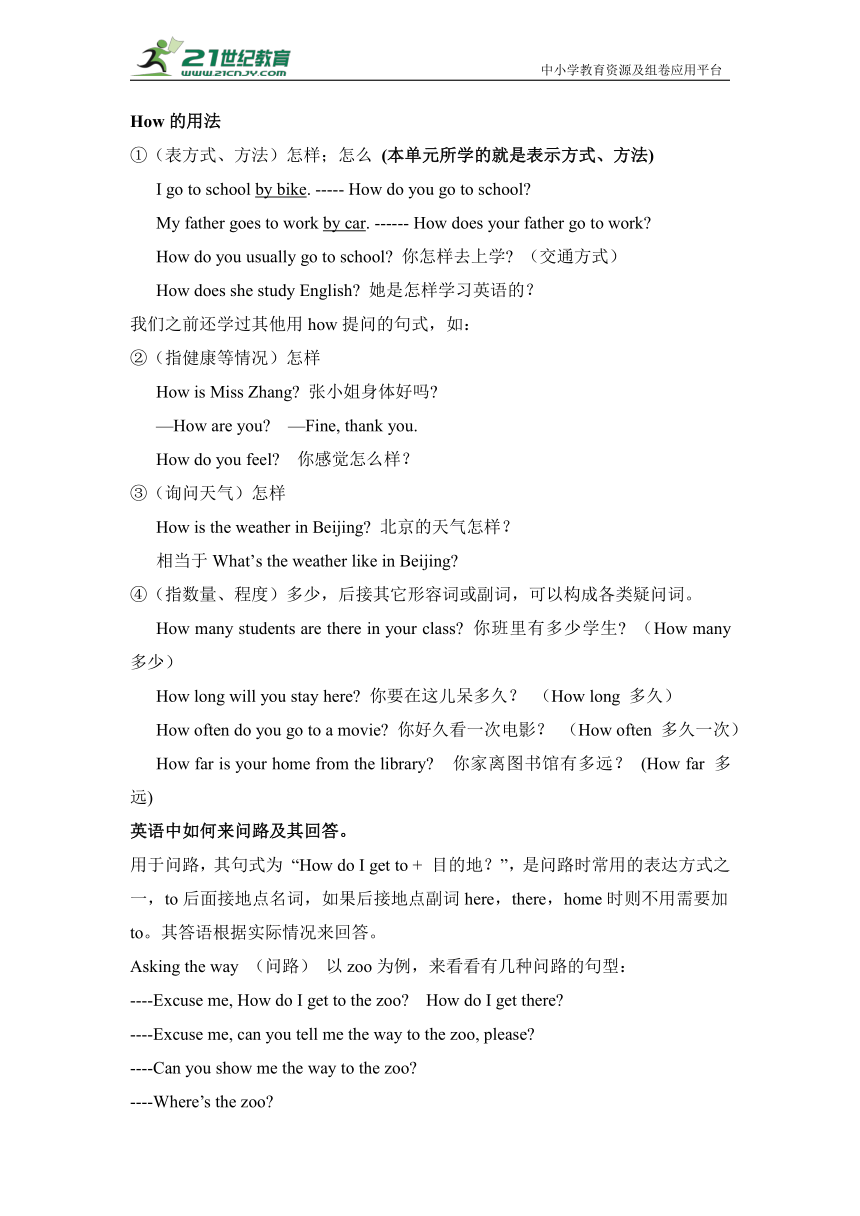
文档简介
中小学教育资源及组卷应用平台
五年级下知识点复习及专项练习
必背句型
1. There is a party at the prince’s house. 在王子家有一场晚会。
2. Cinderella, come and help me! 灰姑娘,过来帮我!
3. Why are you so sad, dear 亲爱的,为什么如此难过?
4. Because I can’t go to the party. 因为我不能参加晚会。
5. Because I don’t have any nice clothes or shoes. 因为我没有漂亮的衣服和鞋子。
6. Cinderella puts on the new clothes and shoes. 灰姑娘穿上新衣服和鞋子。
7. Come back before 12 o’clock. 12点钟前回来。
8. Cinderella has a good time at the party. 灰姑娘在晚会上玩得很开心。
9. Sorry, I have to go now. 对不起,我现在不得不走。
10. Many girls try on the shoe, but it does not fit.
许多姑娘试穿这只鞋子,但是它不合适。
11.Where do you(they) live 你(他们)住哪里?
I live on Moon Street, near City Library.我住在月亮街,市图书馆附近。
12.How do you come to school
Su Yang and I come to school by bus.
=Su Yang and I take a bus to school
你怎样来学校?我和苏阳乘公交车去学校。
13. Where do you live I live near school.
I go to school on foot. = I walk to school.
你住在哪里?我住在学校附件。我步行去学校。
14.(I live/She lives) in Sunshine Town在阳光镇
on Park Street 在公园街
15. He lives near school. 他住在学校附件。
He lives far from school. 他家离学校远。
16. He likes riding it. 他喜欢骑自行车。
17. Can I go to school by bike
= Can I ride a bike to school
18.波比想要向Sam展示他的自行车。
Bobby wants to show his bike to Sam. =
Bobby would like to show Sam his bike
19.波比的爸爸不认为。他总是坐在篮子里。
Bobby’s dad does not think so.
He always sits in the basket.
20. Excuse me, how do I get to the book shop on Moon Street
打扰一下,我怎么才能到达月亮街上的书店?
21. Go along this street. Turn left at the traffic lights. 沿着这条街走。在交通灯那边向左转。
22. Get on the bus at Park Station. Get off at City Library Station. 在公园站上车。在市图书馆站下车
23. You can see the bookshop on your left. 你可以看到书店在你的左边。
24. Yang Ling asks a policeman for help. 杨玲向警察寻找帮助。
25. How do we get to City Cinema We can go by bus. 我们怎么才能到市电影院?我们可以坐公交
26. They wait for the bus at the bus stop. 他们在车站等公交车。
27. Let’s go to the hospital by taxi. 让我们坐车租车去医院吧。
28. They get to the cinema by metro, but the film is over. 他们坐地铁到达了电影院,但电影结束了。
29.It is Saturday morning这是星期六早上。
30.I am helping him.我正在帮助他。
31.My mother is cooking breakfast in the kitchen.我的妈妈正在厨房里做早饭。
32.Helen and I are helping her.海伦和我正在帮助她。
33.What are Tim and Jim doing They are eating fruit in the living room.蒂姆和吉姆正在做什么?他们在起居室里吃水果。
34.We’re eating your grapes.我们正在吃你的葡萄。
35.The pests go away,but the ladybirds do not.害虫离开了,但是瓢虫没有。
36.The Spring Festival is in January or February.春节在一月或二月。
37.The Dragon Boat Festival is in May or June.端午节在五月或六月。
38.The Mid-autumn Festival is in September or October.中秋节在九月或十月。
39.The Double Ninth Festival is in October or November.重阳节在十月或十一月。
40.People also call it Chinese New Year.人们也称作中国新年。
41.At this festival,people get together with their family.
在这个节日,人们和他们的家人团聚在一起。
42.People eat rice dumplings at this festival.人们在这个节日吃粽子。
43.There are dragon boat races in some places.在一些地方有龙舟赛。
44.It is a festival for old people.是给老人的节日。
45.What should we give mum 我们应该给妈妈什么呢?
语法知识归纳
why引导的询问原因的特殊疑问句的用法。
其句式为 “why+一般疑问句”,在回答时用“Because..”。
如: ---Why do you like animals 你为什么喜欢动物?
---Because they’re very lovely. 因为它们很可爱。
Why后面直接加not,表示询问和建议。句型结构为:Why not + 动词原形?意为 “为什么不……呢?” 如:
You are so tired. Why not go to bed 你这么累?为什么不去睡觉呢?
It’s late. Why not take a taxi 要迟到了。为什么不打的呢?
特殊疑问词的用法。
what用来询问东西, when用来询问时间,where用来询问地点,who用来询问人,whose 用来询问某人的东西。这些疑问词在特殊疑问句中都放在句首,后接一般疑问句的句式。
特殊疑问词用法小结归纳与配套练习
单词 意思 用法 单词 意思 用法
when 什么时间 问时间 what 什么 问东西
who 谁 问人 what time 什么时间 问时间
whom 谁 问人 what colour 什么颜色 问颜色
whose 谁的 问主人 what about …怎么样 问意见
where 在哪里 问地点 what day 星期几 问星期
which 哪一个 问选择 what date 什么日期 问具体日期
why 为什么 问原因 what for 为何目的 问目的
how …怎么样 问情况 how much 多少 问价钱
how old 多大 问年龄 how about …怎么样 问意见
how many 多少 问数量 how far 多远 问路程
have to与一般情态动词(如:can, must, may)的对比
相同点:
一般的情态动词不能单独作谓语,后面必须接动词原形一起构成谓语,have to也是这样。
不同点:
1)一般的情态动词没有人称和数的变化,而且所用的时态也受到一定的限制,而have to 有人称和数的变化。可用于多种时态中:一般现在时中当主语是第三人称单数时要用has to,其余的人称用have to,一般过去时中要用had to; 一般将来时中则要用will have to。如:
She has to go to school by bus. 她不得不乘公交车上学。
You'll have to see the doctor if you get ill. 如果你生病了,就得去看医生。
2)否定句和疑问句的构成方式不同:
①一般的情态动词直接在后面加not构成否定句,把这些情态动词提到句首就构成一般疑问句。
②而have to 的否定句和疑问句的构成往往要借助于助动词do的适当形式或助动词will即have to, has to, had to和will have to的否定式分别为don't have to, doesn't have to, didn't have to和won't have to,疑问句是在句首加助动词do的相应形式,句中还原成have to或把will放到句首,这里have to简直就是一个十足的行为动词。如:
What does she have to do 她必须做什么?
You didn't have to wait for me yesterday. 昨天你没有必要等我
How的用法
①(表方式、方法)怎样;怎么 (本单元所学的就是表示方式、方法)
I go to school by bike. ----- How do you go to school
My father goes to work by car. ------ How does your father go to work
How do you usually go to school 你怎样去上学 (交通方式)
How does she study English 她是怎样学习英语的?
我们之前还学过其他用how提问的句式,如:
②(指健康等情况)怎样
How is Miss Zhang 张小姐身体好吗
—How are you —Fine, thank you.
How do you feel 你感觉怎么样?
③(询问天气)怎样
How is the weather in Beijing 北京的天气怎样?
相当于What’s the weather like in Beijing
④(指数量、程度)多少,后接其它形容词或副词,可以构成各类疑问词。
How many students are there in your class 你班里有多少学生 (How many 多少)
How long will you stay here 你要在这儿呆多久? (How long 多久)
How often do you go to a movie 你好久看一次电影? (How often 多久一次)
How far is your home from the library 你家离图书馆有多远? (How far 多远)
英语中如何来问路及其回答。
用于问路,其句式为 “How do I get to + 目的地?”,是问路时常用的表达方式之一,to后面接地点名词,如果后接地点副词here,there,home时则不用需要加to。其答语根据实际情况来回答。
Asking the way (问路) 以zoo为例,来看看有几种问路的句型:
----Excuse me, How do I get to the zoo How do I get there
----Excuse me, can you tell me the way to the zoo, please
----Can you show me the way to the zoo
----Where’s the zoo
----Can you tell me how to get to the zoo
----Which is the way to the zoo
wrong的用法。
wrong用作形容词,意为“有毛病的”。
举例: What’s wrong with you 你哪里不舒服?
What’s wrong with him
拓展: (1)与something, anything, nothing等连用,表示“出事”, “有毛病”
例如:There is something wrong with you. 你看起来有些不对劲。
(2)表示“某人做某事是不对的”
例如:You are wrong to do it. 你这样做是不对的。
英语中疼痛的表达
headache
headache用作名词,意为“头疼”
例:I have a headache.我头疼。
再如:have a bad cough 咳嗽得厉害, have a bad toothache 牙疼得厉害
ache意为“疼”, 可独立使用,是名词也可以是动词。它可以和身体部位单词组合成一个复合词,-ache 就成了一个名词后缀,指“(持续而隐约的)疼痛”。例如:backache背痛,earache耳痛,headache头痛,stomach-ache胃痛,toothache牙痛
ache做动词时,指“持续地隐隐作痛”,在句中作谓语。例如:
My head is aching. 我头痛。
I’m aching all over. 我浑身疼痛。
现在进行时的特殊疑问句和肯定句。
现在进行时表示现在正在进行或发生的动作。通常与表示现在的时间的单词连用及句首为look,listen等动词连用
现在进行时的构成:be动词(am,is,are)+动词-ing形式。
现在进行时的肯定句式结构:
主语+be动词(am,is,are)+动词-ing形式+其他。
现在进行时的特殊疑问句式结构:
特殊疑问词+be动词(am,is,are)+主语+动词-ing形式+其他?
动词现在分词的构成:
(1)大部分动词是在其原形后直接加-ing
do-doing,clean-cleaning,cook-cooking,eat-eating,help-helping,wash-washing,watch-watching。
以不发音e结尾的动词,先去掉e,再加-ing。
make-making,write-writing,take-taking,skate-skating,have-having,ride-riding
以重读闭音节结尾的动词,如果末尾只有一个辅音字母,则应先双写这个字母,再加-ing。
sit-sitting,swim-swimming,put-putting,run-running
节日的表达。
在月份前面应用介词in来修饰。介词in一般放在年、月、季节等比较大的时间之前,表示泛指的上午、下午、晚上也用介词in。
而在具体到某一天时则要用介词on。
如:Children’s Day is in June. 儿童节在六月。
In spring, it is warm. 在春天,天气很温暖。
China’s National Day is on the first of October. 中国的国庆节在十月一日。
Mother’s Day is on the second day of May. 母亲节在五月的第二个星期天。
知识拓展:一般来说,在由festival构成的我国传统节日名称前用the,如the Spring Festival (春节),the Lantern Festival (元宵节),the Dragon Boat Festival (端午节),the Mid-Autumn Festival (中秋节),the Double Ninth Festival (重阳节),而在由day构成的节日名称前不用the,如May Day (劳动节),Children’s Day (儿童节),Mother's day (母亲节),Father’s Day (父亲节),Teachers’ Day (教师节),New Year’s Day (元旦)等。
基数词VS序数词
数词分基数词和序数词,基数词表示数量,序数词表示顺序。
one---first (1st) two---second (2nd) three---third (3rd)
four---fourth (4th) five---fifth (5th) six---sixth (6th)
seven---seventh (7th) eight---eighth (8th) nine---ninth (9th)
ten---tenth (10th) eleven---eleventh (11th) twelve---twelfth (12th)
thirteen--- thirteenth(13th) fourteen---fourteenth (14th)
fifteen---fifteenth (15th) six---sixteenth (16th)
seventeen---seventeenth (17th) eighteen---eighteenth (18th)
nineteen---nineteenth (19th) twenty---twentieth (20th)
twenty-one--- twenty-first (21st) twenty-two---twenty-second (22nd)
twenty-three---twenty-third (23rd) thirty-one---thirty-first (31st)
thirty-two---thirty-second (32nd) thirty-three---thirty-third (33rd)
由基数词变为序数词,下面的口诀可以帮助同学们有效记忆。
一、二、三,单独记;
八去t,九除e,
ve要用f替,
整十基数变序数,
先把ty变成tie;
要是遇到两位数,
十位基数个位序。
温馨提示
在使用序数词,需要注意以下几点:
(1)序数词在使用时,一般加上定冠词the。 如:
the first book / the second floor/ the third floor/ the fourth day
(2)序数词之前可以使用形容词性物主代词,但是不能和定冠词连用。如:
This is his first time to play football.
He is the first student to own a computer in his town.
(3)序数词的前面可以加上不定冠词a/ an, 表示“再一”,“又一”。如:
Don’t worry, you can have a second try.
He needs a third one.
(4)请注意编号的表示方法。如:
Lesson 1= the first lesson Group 2= the second group Team 3= the third team
基础训练
一、英汉词组互译。
1. 在八月__________ 2. play with the cat__________
3. 举行一个生日聚会__________ 4. open their presents __________
5. 一起吃生日蛋糕__________ 6. see some numbers__________
7. 在家里__________ 8. on the fifth of June__________
9. 跑走了 _________ 10. start fighting__________
二、单项选择。
( ) 1.The Double Ninth Festival is a festival for __________.
A. children B. young people C.old people
( ) 2. Would you like _____ apple juice No, I’d like _____ warm water.
A. any ; some B. some ;some C. some ; any
( ) 3. --- What’s wrong with _____ --- ______ have a cold.
A. them ; They B. they ; Them C. them ; their
( ) 4.You shouldn’t _______ so many sweets.
A. eat B. eats C. eating
( ) 5. ---What’s Wang Bing doing ---He’s ______ his toy ship______his friends.
A. show ; for B. showing ; for C. showing ; to
( ) 6. In ___________, we ask “Where is the toilet ”
In ___________, we ask “Where's the restroom ”
A. UK ; US B. the US ; the UK C. the UK ; the US
( ) 7.There are five ______ and three_________ in the fridge.
A.tomatos; potatos B. tomatoes;potatoes C. tomatoes; potatos
( )8. Mrs Green’s _______ son is in Japan now.
A.second B. the second C. the two
( )9. Sunday is _________ day of a week.
A. the seventh B. seventh C. the first
( )10. He always ______ at the party. Now, he _________.
A. sings, sings B. is singing, sings C. sings, is singing
( )11. They are my great ________.
A. a hero B. hero C. heroes
( )12. I’d like a big cake ________ some fruits _____ my birthday party.
A. of; for B. with; for C. of; at
三、按要求改写句子。
1. We have a great time at the fancy dress party. (改为同义句)
We have a of at the fancy dress party.
2. Nancy has some dolls in her bedroom. (改为否定句)
Nancy dolls in her bedroom.
3. He takes the taxi to the cinema.(对划线部分提问)
he get to the cinema
4. eat, people, rice, at, festival, dumplings, this, usually(.) (连词成句)
四、根据中文提示完成句子,每空一词。
1. — 番茄汤的味道怎么样?
— 太美味了,我很喜爱。
— __________ the __________ ___________
— It’s yummy. I ________ it.
2. 我牙疼,不能吃任何东西了。
I have a __________. I can’t eat __________.
3. 刘涛正在冰箱里找果汁吗
_________ Liu Tao _________ ________ juice in the fridge
4. 上课时间到了。我们不得不停止这个游戏。
It’s time for class. We ________ _________ stop the __________.
答案
一
1. in August 2. 和猫一起玩 3. have a birthday party
4. 打开他们的礼物 5. eat the birthday cake together 6. 看见一些数字
7. at home 8. 在6月5日 9. run away
10. 开始战斗
二1-5CBAAC 6-10CBACC 11-12CB
三 1. lot, fun 2. doesn’t, have, any 3. How, does 4. People usually eat dumplings at this festival.
四、1. How’s, tomato, soup, love 2. toothache, anything
3. Is, looking, for 4. have, to, game
五年级下知识点复习及专项练习
必背句型
1. There is a party at the prince’s house. 在王子家有一场晚会。
2. Cinderella, come and help me! 灰姑娘,过来帮我!
3. Why are you so sad, dear 亲爱的,为什么如此难过?
4. Because I can’t go to the party. 因为我不能参加晚会。
5. Because I don’t have any nice clothes or shoes. 因为我没有漂亮的衣服和鞋子。
6. Cinderella puts on the new clothes and shoes. 灰姑娘穿上新衣服和鞋子。
7. Come back before 12 o’clock. 12点钟前回来。
8. Cinderella has a good time at the party. 灰姑娘在晚会上玩得很开心。
9. Sorry, I have to go now. 对不起,我现在不得不走。
10. Many girls try on the shoe, but it does not fit.
许多姑娘试穿这只鞋子,但是它不合适。
11.Where do you(they) live 你(他们)住哪里?
I live on Moon Street, near City Library.我住在月亮街,市图书馆附近。
12.How do you come to school
Su Yang and I come to school by bus.
=Su Yang and I take a bus to school
你怎样来学校?我和苏阳乘公交车去学校。
13. Where do you live I live near school.
I go to school on foot. = I walk to school.
你住在哪里?我住在学校附件。我步行去学校。
14.(I live/She lives) in Sunshine Town在阳光镇
on Park Street 在公园街
15. He lives near school. 他住在学校附件。
He lives far from school. 他家离学校远。
16. He likes riding it. 他喜欢骑自行车。
17. Can I go to school by bike
= Can I ride a bike to school
18.波比想要向Sam展示他的自行车。
Bobby wants to show his bike to Sam. =
Bobby would like to show Sam his bike
19.波比的爸爸不认为。他总是坐在篮子里。
Bobby’s dad does not think so.
He always sits in the basket.
20. Excuse me, how do I get to the book shop on Moon Street
打扰一下,我怎么才能到达月亮街上的书店?
21. Go along this street. Turn left at the traffic lights. 沿着这条街走。在交通灯那边向左转。
22. Get on the bus at Park Station. Get off at City Library Station. 在公园站上车。在市图书馆站下车
23. You can see the bookshop on your left. 你可以看到书店在你的左边。
24. Yang Ling asks a policeman for help. 杨玲向警察寻找帮助。
25. How do we get to City Cinema We can go by bus. 我们怎么才能到市电影院?我们可以坐公交
26. They wait for the bus at the bus stop. 他们在车站等公交车。
27. Let’s go to the hospital by taxi. 让我们坐车租车去医院吧。
28. They get to the cinema by metro, but the film is over. 他们坐地铁到达了电影院,但电影结束了。
29.It is Saturday morning这是星期六早上。
30.I am helping him.我正在帮助他。
31.My mother is cooking breakfast in the kitchen.我的妈妈正在厨房里做早饭。
32.Helen and I are helping her.海伦和我正在帮助她。
33.What are Tim and Jim doing They are eating fruit in the living room.蒂姆和吉姆正在做什么?他们在起居室里吃水果。
34.We’re eating your grapes.我们正在吃你的葡萄。
35.The pests go away,but the ladybirds do not.害虫离开了,但是瓢虫没有。
36.The Spring Festival is in January or February.春节在一月或二月。
37.The Dragon Boat Festival is in May or June.端午节在五月或六月。
38.The Mid-autumn Festival is in September or October.中秋节在九月或十月。
39.The Double Ninth Festival is in October or November.重阳节在十月或十一月。
40.People also call it Chinese New Year.人们也称作中国新年。
41.At this festival,people get together with their family.
在这个节日,人们和他们的家人团聚在一起。
42.People eat rice dumplings at this festival.人们在这个节日吃粽子。
43.There are dragon boat races in some places.在一些地方有龙舟赛。
44.It is a festival for old people.是给老人的节日。
45.What should we give mum 我们应该给妈妈什么呢?
语法知识归纳
why引导的询问原因的特殊疑问句的用法。
其句式为 “why+一般疑问句”,在回答时用“Because..”。
如: ---Why do you like animals 你为什么喜欢动物?
---Because they’re very lovely. 因为它们很可爱。
Why后面直接加not,表示询问和建议。句型结构为:Why not + 动词原形?意为 “为什么不……呢?” 如:
You are so tired. Why not go to bed 你这么累?为什么不去睡觉呢?
It’s late. Why not take a taxi 要迟到了。为什么不打的呢?
特殊疑问词的用法。
what用来询问东西, when用来询问时间,where用来询问地点,who用来询问人,whose 用来询问某人的东西。这些疑问词在特殊疑问句中都放在句首,后接一般疑问句的句式。
特殊疑问词用法小结归纳与配套练习
单词 意思 用法 单词 意思 用法
when 什么时间 问时间 what 什么 问东西
who 谁 问人 what time 什么时间 问时间
whom 谁 问人 what colour 什么颜色 问颜色
whose 谁的 问主人 what about …怎么样 问意见
where 在哪里 问地点 what day 星期几 问星期
which 哪一个 问选择 what date 什么日期 问具体日期
why 为什么 问原因 what for 为何目的 问目的
how …怎么样 问情况 how much 多少 问价钱
how old 多大 问年龄 how about …怎么样 问意见
how many 多少 问数量 how far 多远 问路程
have to与一般情态动词(如:can, must, may)的对比
相同点:
一般的情态动词不能单独作谓语,后面必须接动词原形一起构成谓语,have to也是这样。
不同点:
1)一般的情态动词没有人称和数的变化,而且所用的时态也受到一定的限制,而have to 有人称和数的变化。可用于多种时态中:一般现在时中当主语是第三人称单数时要用has to,其余的人称用have to,一般过去时中要用had to; 一般将来时中则要用will have to。如:
She has to go to school by bus. 她不得不乘公交车上学。
You'll have to see the doctor if you get ill. 如果你生病了,就得去看医生。
2)否定句和疑问句的构成方式不同:
①一般的情态动词直接在后面加not构成否定句,把这些情态动词提到句首就构成一般疑问句。
②而have to 的否定句和疑问句的构成往往要借助于助动词do的适当形式或助动词will即have to, has to, had to和will have to的否定式分别为don't have to, doesn't have to, didn't have to和won't have to,疑问句是在句首加助动词do的相应形式,句中还原成have to或把will放到句首,这里have to简直就是一个十足的行为动词。如:
What does she have to do 她必须做什么?
You didn't have to wait for me yesterday. 昨天你没有必要等我
How的用法
①(表方式、方法)怎样;怎么 (本单元所学的就是表示方式、方法)
I go to school by bike. ----- How do you go to school
My father goes to work by car. ------ How does your father go to work
How do you usually go to school 你怎样去上学 (交通方式)
How does she study English 她是怎样学习英语的?
我们之前还学过其他用how提问的句式,如:
②(指健康等情况)怎样
How is Miss Zhang 张小姐身体好吗
—How are you —Fine, thank you.
How do you feel 你感觉怎么样?
③(询问天气)怎样
How is the weather in Beijing 北京的天气怎样?
相当于What’s the weather like in Beijing
④(指数量、程度)多少,后接其它形容词或副词,可以构成各类疑问词。
How many students are there in your class 你班里有多少学生 (How many 多少)
How long will you stay here 你要在这儿呆多久? (How long 多久)
How often do you go to a movie 你好久看一次电影? (How often 多久一次)
How far is your home from the library 你家离图书馆有多远? (How far 多远)
英语中如何来问路及其回答。
用于问路,其句式为 “How do I get to + 目的地?”,是问路时常用的表达方式之一,to后面接地点名词,如果后接地点副词here,there,home时则不用需要加to。其答语根据实际情况来回答。
Asking the way (问路) 以zoo为例,来看看有几种问路的句型:
----Excuse me, How do I get to the zoo How do I get there
----Excuse me, can you tell me the way to the zoo, please
----Can you show me the way to the zoo
----Where’s the zoo
----Can you tell me how to get to the zoo
----Which is the way to the zoo
wrong的用法。
wrong用作形容词,意为“有毛病的”。
举例: What’s wrong with you 你哪里不舒服?
What’s wrong with him
拓展: (1)与something, anything, nothing等连用,表示“出事”, “有毛病”
例如:There is something wrong with you. 你看起来有些不对劲。
(2)表示“某人做某事是不对的”
例如:You are wrong to do it. 你这样做是不对的。
英语中疼痛的表达
headache
headache用作名词,意为“头疼”
例:I have a headache.我头疼。
再如:have a bad cough 咳嗽得厉害, have a bad toothache 牙疼得厉害
ache意为“疼”, 可独立使用,是名词也可以是动词。它可以和身体部位单词组合成一个复合词,-ache 就成了一个名词后缀,指“(持续而隐约的)疼痛”。例如:backache背痛,earache耳痛,headache头痛,stomach-ache胃痛,toothache牙痛
ache做动词时,指“持续地隐隐作痛”,在句中作谓语。例如:
My head is aching. 我头痛。
I’m aching all over. 我浑身疼痛。
现在进行时的特殊疑问句和肯定句。
现在进行时表示现在正在进行或发生的动作。通常与表示现在的时间的单词连用及句首为look,listen等动词连用
现在进行时的构成:be动词(am,is,are)+动词-ing形式。
现在进行时的肯定句式结构:
主语+be动词(am,is,are)+动词-ing形式+其他。
现在进行时的特殊疑问句式结构:
特殊疑问词+be动词(am,is,are)+主语+动词-ing形式+其他?
动词现在分词的构成:
(1)大部分动词是在其原形后直接加-ing
do-doing,clean-cleaning,cook-cooking,eat-eating,help-helping,wash-washing,watch-watching。
以不发音e结尾的动词,先去掉e,再加-ing。
make-making,write-writing,take-taking,skate-skating,have-having,ride-riding
以重读闭音节结尾的动词,如果末尾只有一个辅音字母,则应先双写这个字母,再加-ing。
sit-sitting,swim-swimming,put-putting,run-running
节日的表达。
在月份前面应用介词in来修饰。介词in一般放在年、月、季节等比较大的时间之前,表示泛指的上午、下午、晚上也用介词in。
而在具体到某一天时则要用介词on。
如:Children’s Day is in June. 儿童节在六月。
In spring, it is warm. 在春天,天气很温暖。
China’s National Day is on the first of October. 中国的国庆节在十月一日。
Mother’s Day is on the second day of May. 母亲节在五月的第二个星期天。
知识拓展:一般来说,在由festival构成的我国传统节日名称前用the,如the Spring Festival (春节),the Lantern Festival (元宵节),the Dragon Boat Festival (端午节),the Mid-Autumn Festival (中秋节),the Double Ninth Festival (重阳节),而在由day构成的节日名称前不用the,如May Day (劳动节),Children’s Day (儿童节),Mother's day (母亲节),Father’s Day (父亲节),Teachers’ Day (教师节),New Year’s Day (元旦)等。
基数词VS序数词
数词分基数词和序数词,基数词表示数量,序数词表示顺序。
one---first (1st) two---second (2nd) three---third (3rd)
four---fourth (4th) five---fifth (5th) six---sixth (6th)
seven---seventh (7th) eight---eighth (8th) nine---ninth (9th)
ten---tenth (10th) eleven---eleventh (11th) twelve---twelfth (12th)
thirteen--- thirteenth(13th) fourteen---fourteenth (14th)
fifteen---fifteenth (15th) six---sixteenth (16th)
seventeen---seventeenth (17th) eighteen---eighteenth (18th)
nineteen---nineteenth (19th) twenty---twentieth (20th)
twenty-one--- twenty-first (21st) twenty-two---twenty-second (22nd)
twenty-three---twenty-third (23rd) thirty-one---thirty-first (31st)
thirty-two---thirty-second (32nd) thirty-three---thirty-third (33rd)
由基数词变为序数词,下面的口诀可以帮助同学们有效记忆。
一、二、三,单独记;
八去t,九除e,
ve要用f替,
整十基数变序数,
先把ty变成tie;
要是遇到两位数,
十位基数个位序。
温馨提示
在使用序数词,需要注意以下几点:
(1)序数词在使用时,一般加上定冠词the。 如:
the first book / the second floor/ the third floor/ the fourth day
(2)序数词之前可以使用形容词性物主代词,但是不能和定冠词连用。如:
This is his first time to play football.
He is the first student to own a computer in his town.
(3)序数词的前面可以加上不定冠词a/ an, 表示“再一”,“又一”。如:
Don’t worry, you can have a second try.
He needs a third one.
(4)请注意编号的表示方法。如:
Lesson 1= the first lesson Group 2= the second group Team 3= the third team
基础训练
一、英汉词组互译。
1. 在八月__________ 2. play with the cat__________
3. 举行一个生日聚会__________ 4. open their presents __________
5. 一起吃生日蛋糕__________ 6. see some numbers__________
7. 在家里__________ 8. on the fifth of June__________
9. 跑走了 _________ 10. start fighting__________
二、单项选择。
( ) 1.The Double Ninth Festival is a festival for __________.
A. children B. young people C.old people
( ) 2. Would you like _____ apple juice No, I’d like _____ warm water.
A. any ; some B. some ;some C. some ; any
( ) 3. --- What’s wrong with _____ --- ______ have a cold.
A. them ; They B. they ; Them C. them ; their
( ) 4.You shouldn’t _______ so many sweets.
A. eat B. eats C. eating
( ) 5. ---What’s Wang Bing doing ---He’s ______ his toy ship______his friends.
A. show ; for B. showing ; for C. showing ; to
( ) 6. In ___________, we ask “Where is the toilet ”
In ___________, we ask “Where's the restroom ”
A. UK ; US B. the US ; the UK C. the UK ; the US
( ) 7.There are five ______ and three_________ in the fridge.
A.tomatos; potatos B. tomatoes;potatoes C. tomatoes; potatos
( )8. Mrs Green’s _______ son is in Japan now.
A.second B. the second C. the two
( )9. Sunday is _________ day of a week.
A. the seventh B. seventh C. the first
( )10. He always ______ at the party. Now, he _________.
A. sings, sings B. is singing, sings C. sings, is singing
( )11. They are my great ________.
A. a hero B. hero C. heroes
( )12. I’d like a big cake ________ some fruits _____ my birthday party.
A. of; for B. with; for C. of; at
三、按要求改写句子。
1. We have a great time at the fancy dress party. (改为同义句)
We have a of at the fancy dress party.
2. Nancy has some dolls in her bedroom. (改为否定句)
Nancy dolls in her bedroom.
3. He takes the taxi to the cinema.(对划线部分提问)
he get to the cinema
4. eat, people, rice, at, festival, dumplings, this, usually(.) (连词成句)
四、根据中文提示完成句子,每空一词。
1. — 番茄汤的味道怎么样?
— 太美味了,我很喜爱。
— __________ the __________ ___________
— It’s yummy. I ________ it.
2. 我牙疼,不能吃任何东西了。
I have a __________. I can’t eat __________.
3. 刘涛正在冰箱里找果汁吗
_________ Liu Tao _________ ________ juice in the fridge
4. 上课时间到了。我们不得不停止这个游戏。
It’s time for class. We ________ _________ stop the __________.
答案
一
1. in August 2. 和猫一起玩 3. have a birthday party
4. 打开他们的礼物 5. eat the birthday cake together 6. 看见一些数字
7. at home 8. 在6月5日 9. run away
10. 开始战斗
二1-5CBAAC 6-10CBACC 11-12CB
三 1. lot, fun 2. doesn’t, have, any 3. How, does 4. People usually eat dumplings at this festival.
四、1. How’s, tomato, soup, love 2. toothache, anything
3. Is, looking, for 4. have, to, game
同课章节目录
